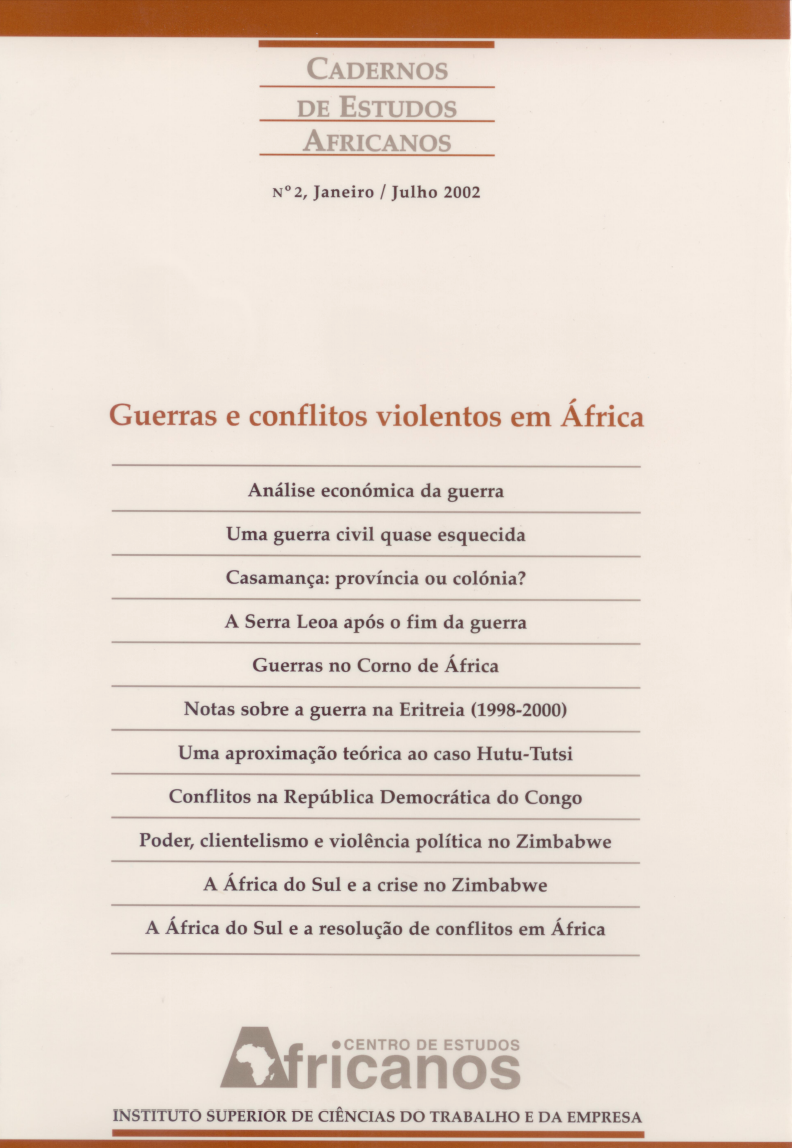Poder, clientelismo e violência política no Zimbabwe: a Terceira Chimurenga
DOI:
https://doi.org/10.4000/cea.1329Palavras-chave:
violência, Terceira Chimurenga, política, ZimbabuéResumo
As conflitualidades que hoje assolam a sociedade zimbabweana são o resultado das pressões cumulativas induzidas por injustiças herdadas do tempo colonial, por uma grave crise económica e pela crescente ineficácia de um sistema político autocrático. Descartada que é, pela grande maioria dos observadores internos e externos, a dimensão racial como um factor autónomo de atrito, é normalmente aceite que os principais conflitos hoje presentes na sociedade zimbabweana podem ser integrados em três áreas bem identificadas: 1) uma área de conflitualidade económica e social, 2) uma área de conflitualidade fundamentalmente política, 3) uma área de conflitualidade regional e étnica.Referências
Chris Talbot & Chris Marsden, 2002, «Narrow Victory for Mugabe in Zimbabwe Elections sets Stage for Further Upheavals», in World Socialist Web Site, 29 de Junho de 2002 (http://www.wsws.org/articles/2000/jun2000/zimb-j29.shtml).
Georges Nzongola-Ntalaja & Margaret C. Lee (eds.), 1997, The State and Democracy in Africa, Harare, AAPS Books.
Hevina S. Dashwood & Cranford Pratt, 1999, «Leadership, Participation and Conflict Management: Zimbabwe and Tanzania», in Taisier M. Ali & Robert O. Matthews (eds.), Civil Wars in Africa: Roots and Resolution, Montreal & Kingston/London/Ithaca, McGill-Queens University Press, pp. 223:254.
International Crisis Group (ICG), 2001, Zimbabwe in Crisis: Finding a Way Forward, Africa Report no 32, Harare/Brussels, 13 de Julho 2001.
Jens A. Andersson, 1999, «The Politics of Land Scarcity: Land Disputes in Save Communal Area, Zimbabwe», Journal of Southern African Studies, vol. 25, no 4, Dezembro 1999, pp. 553:578.
Jonathan Moyo, 1992, Voting for Democracy: Electoral Politics in Zimbabwe, Harare, University of Zimbabwe Publications.
Martin Meredith, 2002, Our Votes, our Guns: Robert Mugabe and the Tragedy of Zimbabwe, New York, Public Affairs.
Masipula Sithole, 1995, «Le gouvenement et la vie politique au Zimbabwe depuis l'indépendance», in Jean-Louis Balans & Michel Lafon (dir.), Le Zimbabwe Contemporain, Paris/Nairobi, Karthala/IFRA, pp. 109:145.
Masipula Sithole, 1999, Zimbabwe: Struggles within the Struggle (1957-1980), 2ª edição, Harare, Rujeko Publishers.
Michael Bourdillon, 1987, The Shona Peoples: An Ethnography of the Contemporary Shona, with Special Reference to their Religion, 3ª ed., Gweru, Mambo Press.
Ngwabi Bhebe, 1995, «Healing the War Scars in the Evangelical Lutheran Church in Zimbabwe», in N. Bhebe & Terence Ranger (eds.), Society in Zimbabwe's Liberation War, Harare, University of Zimbabwe Publications, pp. 147:174.
Okwudiba Nnoli, 2000, «Globalisation and Democracy in Africa», in Dani W. Nabudere (ed.), Globalisation and the Post-Colonial African State, Harare, AAPS Books, pp. 173:189.
Patrick Chabal & Jean-Pascal Daloz, 1999, Africa Works: Disorder as Political Instrument, Oxford/Bloomington, James Currey/Indiana University Press.
Stephanie Lawson, 1997, «Cultural Traditions and Identity Politics: Some Implications for Democratic Govemance in Asia and the Pacific», State, Society and Governance in Melanesia Project, Discussion Paper nº 97/4, Australian National University. (http://rspas.anu.edu.au/melanesia/Lawson97_4.html).
Stifiung Wissenchaft Und Politik (SWP)/Conflict Prevention Network (CPN), 1998, «Zimbabwe: A Conflict Study of a Country Without Direction», briefing paper, December 1998.
Thomas Hylland Eriksen, 1999, «Globalization and the Politics of Identity», UN Chronicle, Autumn 1999, (http://www.uio.no/~geirthe/UNChron.html).
Downloads
Publicado
Edição
Secção
Licença
Direitos de Autor (c) 2016 Cadernos de Estudos Africanos

Este trabalho encontra-se publicado com a Licença Internacional Creative Commons Atribuição-NãoComercial-CompartilhaIgual 4.0.
Autorizo a publicação do artigo/recensão submetido do qual sou autor.
Declaro ainda que o presente artigo é original, que não foi objecto de qualquer tipo de publicação, e cedo em exclusivo os direitos de publicação à revista Cadernos de Estudos Africanos. A reprodução do artigo, no todo ou em parte, noutras publicações ou noutros suportes depende de autorização prévia da editora Centro de Estudos Internacionais do Iscte - Instituto Universitário de Lisboa.

